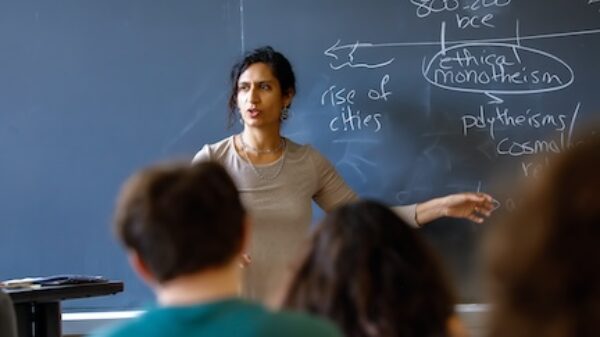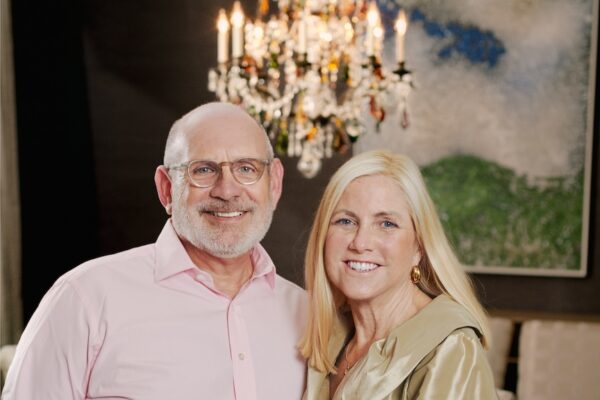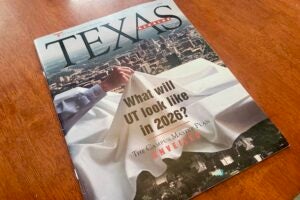by Maureen Turner
Photo credit: Antonio Chicaia
“I’m sort of ancient,” Carl Tricoli, B.A. ’77, says with a laugh, “but I recall that in my college days, a rite of passage was sitting around the Texas Union drinking beer and arguing about whatever aspects of life you were arguing about.”
Those conversations — opportunities to debate big ideas, defend your opinions, hear out the positions of others, and walk away still friends — weren’t just a fun way to pass an evening, Carl says. They were also a key component of what he learned as an undergraduate at The University of Texas at Austin, both inside and outside the classroom: the ability to think analytically and critically.
But today, Carl worries that far too few students experience the sort of open-ended, freewheeling arguments he and his friends enjoyed. “My fear, frankly, looking from the outside, is that people are fearful of expressing their views. There is a hesitancy around real dialogue.” Instead, he says, people hold their tongues to avoid inadvertently offending someone or being excoriated for their opinions — whether in person or, increasingly, on social media platforms, where conflicts spread like wildlife. And that’s a problem not just for individuals. When a society is no longer able to engage in civil discourse, it’s a problem for everyone.
Those concerns prompted Carl and his wife, Tamara, to make a gift to the College of Liberal Arts to create more opportunities for students to engage in these kinds of challenging but invaluable conversations. The Tricolis’ gift provides support for faculty members to develop course material to teach students the basics of civil discourse: active listening, respectful debate and the ability to find common ground when possible and to agree to disagree when not. It also supports speakers, panels and other events where participants can model constructive civil discourse on challenging issues.
You can’t learn to think critically if no one has ever challenged your opinions.
Associate Professor of Middle Eastern Studies Hina Azam was one of the first faculty members to receive a grant from the Tricolis’ gift. She used the funds to develop new material for her “Introduction to Islam” course, which draws a cross-section of students from across majors.
“It’s so timely. It’s so needed,” Hina says of the opportunity presented by the grant. “I’ve been interested for awhile in issues of democracy and authoritarianism. What does it mean to have an open society? What does it mean to have a free society? What does it mean to have a democratic society? And what does it mean to have a civil society? All of those things are interconnected.”
Hina had been thinking about these big questions within the context of the classroom, where she has witnessed an increasing tendency for students to become easily offended by a difference of opinion and, at the same time, to fear expressing their own opinion. Rather than risk being shamed or scolded for sharing views or asking questions others might deem inappropriate, students simply keep their thoughts to themselves.
“That’s detrimental not only to freedom of expression, but to freedom of inquiry,” Hina says. “When we think of a repressive society, we imagine external forces preventing us from expressing our opinions. But as repressive tendencies become more cultural rather than political in nature — when they become things that we do to ourselves — then it’s no longer outside forces that suppress our opinions, it is our internal psychological situation causing us to self-repress. We start not only curtailing what we say, we start curtailing what we inquire about. And you feel more comfortable being with people who are in the same like-minded identity group or bubble that you are in, because it’s too risky to be around people who are different than you.”
That unwillingness to engage in difficult conversations isn’t limited to students. But, Carl believes, the problem is especially dangerous on college campuses, where young people should be developing crucial skills to prepare them for the rest of their lives. “The foundation of a liberal arts education is that you have your ideas challenged, so that you learn not only how to defend your own ideas but so you continually examine your ideas in light of other new information or other perspectives,” he says. “You can’t learn to think critically if no one has ever challenged your opinions.”

What does civil discourse mean to Carl? “First and foremost, it’s the ability to listen to others respectfully, allowing someone to express an opinion that may be at odds — maybe a lot at odds — with your own opinion. And the person listening to you should do the same thing.” But it doesn’t end there. “You need the ability to then take that information and actually use it to challenge your own thinking. If your attitude is ‘my mind is made up,’ if you allow others to speak but you’re not listening or processing, then there may be civil listening, but there’s no discourse. You have to be open to having your own ideas challenged and be willing to modify or change your ideas based on other people’s perspectives. Can the conversations be uncomfortable? Of course. Can you have your thoughts challenged? One-hundred percent,” he says. “That’s the point of this exercise.”
Hina has used her grant to develop four modules for her course, each focused on a specific aspect of religion. In the first module, on belief and identity, students respond in writing to a series of prompts that ask them to reflect on their personal beliefs and their experiences discussing religion with others. Next, Hina uses their responses to plan a guided class discussion that explores those questions in depth. Each student also interviews a classmate about their religious experiences, then writes a reflection on what they gained from the entire exercise. The class repeats the process for the other three modules, which focus on religious expression through dress, representation of Muslims in the media and culture, and, finally, the meaning and limits of civil discourse.
In their reflections, many students indicated an eagerness both to think deeply about these topics and to discuss them candidly with others. “I think that we live in a generation where people are so easily triggered,” one student wrote. “Especially in the United States, Gen Z is constantly looking for reasons to be offended. I think everyone got so used to tiptoeing around Americans in fear of getting ‘canceled.’”
“My ability to think critically and speak confidently about religious subjects has substantially improved,” another wrote. “My confidence has increased as a result of realizing that productive conversations may occur without bias or dismissal. I discovered that I was able to defend my ideas and viewpoints by offering arguments and justifications. I now firmly feel that participating in discussions is the best approach to test one’s knowledge by taking into account various points of view.”
A third student reflected: “I came to the conclusion that the greatest thing hindering religious discussion is the unwillingness to examine your own beliefs.”
For Hina, the experience confirmed that students are eager to be intellectually challenged. “There’s something very exciting about having your mind opened up,” she says. “Your synapses start popping, and you’re like, ‘Whoa, wait, I never thought about this!’ Young people, they want to have their minds opened, they want to have their minds changed.”
It also confirmed that students are capable of tackling difficult conversations. “How much more sensitive can one get than talking about religion, particularly a religion like Islam, in the contemporary world?” Hina notes. “And yet we were able to do it. If we can talk about something that’s really sensitive like that, there are a lot of other topics we should be able to talk about and be OK.”
While the civil discourse initiative is still fairly new, Carl is delighted by the feedback so far. “We framed this gift as a little bit of an experiment: Let’s try this and see what happens,” he says. “And it seems as though this is working. It looks like the students are really enjoying it and they’re getting something out of it.’”
The ultimate dream would be that we’re able to raise more money around this theme and have this be so successful that others take notice at other places.
That kind of intellectual growth is exactly what students should get from their college education, he adds. “I am an enormous believer in the value of a liberal arts education,” says Carl, who majored in psychology but filled his schedule with a range of courses, in disciplines including history, literature and economics. He went on to receive an MBA from the Bayes Business School at City University in London and has spent his career in finance; today, he’s a partner at the private equity firm Denham Capital Management LP, which he co-founded 20 years ago.
The Tricolis’ gift has already inspired interest from other alumni, including John Young, a 1991 graduate of the Plan II Honors Program. When John and his wife, Traci, heard about the Tricolis’ generosity, they offered to host a reception at their home in Houston to present the initiative to other alumni.
“We did it as a salon dinner, and it was great,” says John, who is the chief investment officer at Orchard Global, an asset management firm based in Houston and London. “The whole idea of this type of framework is to teach one how to learn, how to frame a problem, how to understand the pros and cons of it. That kind of learning was so essential to my own education in the liberal arts, and it has been invaluable throughout my life and career.”
The evening at the Youngs, which included a presentation from Professor Azam and vigorous discussion from the guests, reminded John of his days in a Plan II seminar co-taught by legendary professors Paul Woodruff and Robert Solomon. “We sat on the floor in the library and discussed everything. No idea was off-limits. I fear that kind of space isn’t as present on campus as it used to be, and it’s a shame. That process of debate and critical analysis is what creates the better product, the better outcome. It has been hardened by fire. We need to bring that back.”
Carl Tricoli agrees wholeheartedly. “The ultimate dream,” he says, “would be that we’re able to raise more money around this theme and have this be so successful that others take notice at other places and begin implementing it. Let’s see if we can begin to train people at UT to then train the broader community. And we begin to change how people think about how they interact with each other. And all of a sudden, the pendulum begins to swing.”




